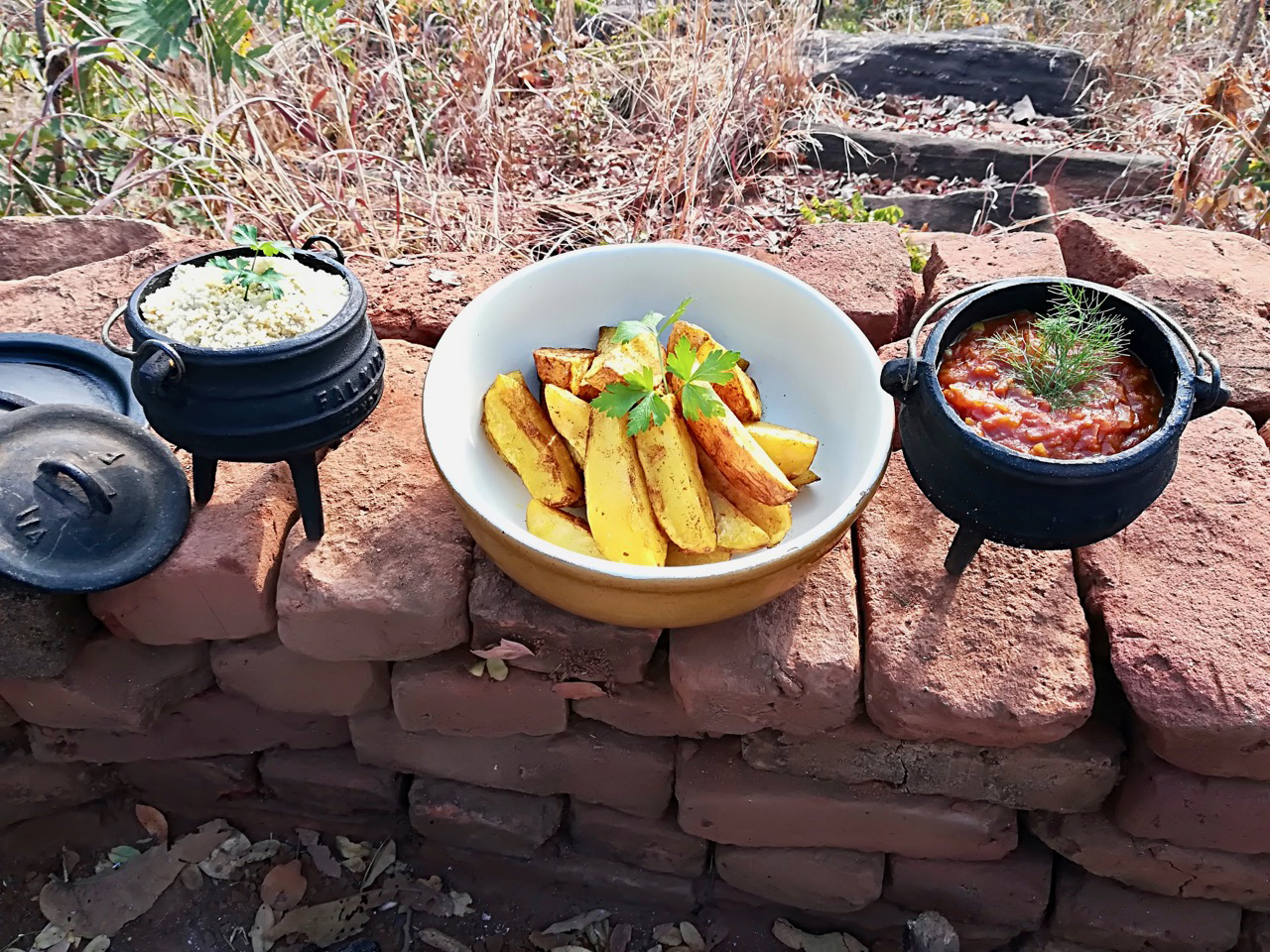FOOD WARRIOR
Vegan, out of Africa – and on a mission

Pioneering Zimbabwean vegan Chef Cola (from Nicola) dishes up gourmet vegan dinners when she pops down to Cape Town to run her pop-ups. Back in Zim she creates vegan military-style ration packs for Africa’s first armed all-women anti-poaching team. Her path to date has taken her to New York, Cape Town, Harare – and the middle of nowhere. Where next?
Nicola “Chef Cola” Kagora offers vegan pop-up dinners in Cape Town. It was while working at Plant – one of the city’s favourite vegan eateries – that she delved, then dived, into veganism.
So, this is a story about veganism. It is also, like any food story – and more so than many – a story about people.
Because, yes, while we talk about what’s on the plate and the ingredients and sometimes the nourishment, and we relish the flavours and aromas and textures and other delectable things that – when we have the good fortune to eat well – make eating so pleasurable: when you get to the core of the apple, the heart of the artichoke, food stories are in essence stories about people.
All the way back to the farmer. All the way forward to the cook and the eater.
In the case of this story, “people” also include the Akashinga (“the brave ones”) – Africa’s first armed all-women anti-poaching unit. Their mission? To restore to wilderness a 115-square-mile former trophy hunting tract in Zimbabwe’s Zambezi Valley ecosystem. Not only to protect the remaining animals – the region has lost thousands of elephants to poaching – but also to financially benefit (through tourism and in other ways) the dirt-poor communities that intersect with this vast wildlife tract.
The diet of the Akashinga, these super-charged, empowered – previously disadvantaged (read “desperate”, “abused”, “defeated”) – women recruited from the communities they now serve?
Which takes us back to Kagora.
The Harare-based foodie was brought in as executive chef to establish a vegan kitchen, manage it, recruit and train cooks – essentially “feed” the Akashinga and all involved with them – by Damien Mander, the former special-ops sniper from the Australian Defence Force who set up the International Anti-Poaching Foundation and established this elite female team that operates deep in the Zimbabwean bush.

Chef Cola has been experimenting with the solar dryer for Akashinga ration packs. Photo: supplied
The hunky, tattooed military man turned conservationist is a committed vegan. He and the squad follow a vegan diet: to support sustainable food choices and avoid “animal cruelty and the hypocrisy of saving one animal only to eat another”.
“The kitchen is in the bush – literally is the middle of nowhere,” Kagora laughs when we finally connect to talk, by WhatsApp, after many messages and attempts at contact.
Shortly before our scheduled interview, I’d received an SOS message. “An emergency has come up in the kitchen.” Could we delay our call?
By that evening she has travelled from the bush kitchen back to Harare. The emergency was an announced three-day shutdown in Zim – which meant she had to get out of the bush kitchen and home.
Back at the bush kitchen, she tells me, besides what one might expect, there is a garden (to grow fresh produce) and a solar dryer. This Kagora has used to experiment with all kinds of fruits and veggies.
“We’re having success with apples, oranges, cabbage, beetroot, par-boiled sweet potatoes, bananas and tomatoes. Sometimes the women are out on extended patrol for a seven-day stretch. It’s hot. They’re in the bush. They need to carry ration packs – light in weight and nutritious – to sustain them.”
When in camp the meals are varied with a focus on nutrition, flavour – “and making sure they have enough energy to do their jobs”.
“We use a lot of dried grains mixed with fresh produce, both vegetables and fruits. The focus in sourcing is on empowering the local community and supporting small entrepreneurs (who might have banana farms or tomato gardens).”
She has recruited and trained vegan chefs, also from the local community. She is, ultimately, responsible for providing nutritious, delicious vegan food for 150 staff, rangers and guests a month – a number that is set to grow.

Bush food. Potato wedges and vegan potjie. Photo: supplied
Having said that, working with the Akashinga is just one bite of Kagora’s vegan apple. Back in Harare she has an experimental garden. “My home garden is my test lab.”
Growing herbs are a focus. “This allows me to experiment more with different flavours. I especially like working with turmeric, garlic and ginger, fresh parsley, lemongrass and mint. A lot depends on what is in season.”
Her home gardener visits the camp with her and trains the camp gardeners in what they’ve found to be successful.
Meanwhile, the 30-year-old is on a mission, thorough her business, African Vegan on a Budget, to develop and promote “African roots” veganism both in Zim and – give her time – everywhere.
Not that she’s sitting there proselytising or condemning meat-eaters. Her story and goals have a pragmatic tang.
For the neophyte she simply suggests following the guidelines of filmmaker James Cameron’s wife, Suzy Amis (the pair are known as the vegan power-couple) who suggests taking one meat-based meal a day off the menu.
Born in Zim, Kagora lived in New York City from the age of three to 12 with her then-diplomat mom and siblings. From a young age, she loved to cook. Was drawn to the kitchen.
But her mom thought hospitality management a more suitable career choice for her daughter. So, after completing high school in Harare, Kagora enrolled at hotel school in Cape Town to study hospitality management.
Which went pretty well until, in her third – practical – year, she was given the option to choose a department and specialise. She selected the kitchen.
And immediately knew this was her calling.
Wanting hands-on experience, she left hotel school and walked into what was then a smaller, cafè version of Cape Town’s Plant. She asked if she might intern there. She had no idea it was a vegan eatery. In fact, knew nothing about veganism.
“I started off as an intern knowing nothing about vegan culture and having to be taught what it was. This was about five years ago. I was surprised to learn about the benefits of vegan plant-based diets compared to many others. I was also wonderfully surprised to find that vegan food can taste really good.
“Now my perspective and philosophy have developed to be one that teaches and educates people. Incorporating a plant-based meal per day in your diet has major health and environmental benefits,” she says.
She was head chef by the time Plant physically moved (she with it) to its current Cape Town location and became the gourmet vegan restaurant it is today.
Since she’s returned to Harare, Kagora has studied plant-based nutrition online through Cornell University and is currently studying health, safety and nutrition through Unisa.
Kagora tells me she is well aware that meat is considered a cornerstone of an African meal. And yes, being vegan is viewed as a Western construct. And veganism in Western culture is typically for the affluent; the rich.
But in a sense it’s an ill wind that blows nobody any good.
Looking at Zimbabwe in the light of food security and nutrition, the impact of climate change on food sources, the economy, there is this interconnected response.
“Zimbabwe right now is a perfect incubator for veganism,” she says. “The electricity goes out from 5am to midnight. There are no fridges, no generators. Families are vegetarian by force. Necessity. From vegetarian to vegan is not too much of a leap.
“In Zimbabwe now, soy chunks are a staple. They are called “nyama” (meat) by the people. These are what most people eat every day, along with pap and greens.”
She is also of the view that veganism originated in Africa.
“I can speak from my own lineage,” she says. “My mother doesn’t eat as much meat as the average person. My grandmother even less. She won’t touch red meat at all. My great-grandmother who died about five years ago didn’t touch meat.
“Doing some research I found that our ancestors only used to slaughter animals – cows, buck, wildlife, whatever – for a ceremony, a tradition, a celebration. We didn’t kill or mass-produce meat for the consumption of human beings.”
She blames colonisation and Western practices for “99% of the meat culture we know as Africans”.
Part of her mission is to reintroduce the “mainly plant-based culture of my ancestors” in Zimbabwe. She also wants to share her Africa-style veganism, and the recipes she’s experimenting with, with the world.
“Veganism to me is a lifestyle choice. There are tremendous natural benefits. It has taken patience and practice to learn how to cook vegan. And one needs to pay attention and be sure one is giving the body what it needs.”
Kagora offers her “Dinner with Chef Cola” pop-ups for 20 guests at a time in Harare and Cape Town. Her intention is to offer an intimate culinary adventure with entertainment and a chance to connect over food, culture and more. The theme is always African inspired – with elements of Western cuisine. Her focus with her prepared dishes is to present the beauty of plant-based African culture and cuisine. Her mission is to introduce people to vegan food and lifestyle and to further inspire those already familiar with veganism with her brand of plant-based cooking. Themes raised include environmental concerns, sustainability and consumption. These at a gathering where people are invited to relax, network and learn.
In Harare she has her own restaurant space.
“In Cape Town I approach a restaurant and asked if I can come and host a dinner on their slowest night.”
Her next Harare dinner is on 28 September. Her next in Cape Town is at MilQ + Honey, Long Street, on 12 November.
Her goal for 2020 is to take her African vegan message to Kenya and Europe. Her ultimate goal? To showcase veganism from Africa – her take on it – in her erstwhile temporary home town, New York. Connect with Chef Cola on Facebook. DM
Wanda Hennig is a food and travel writer based in Durban. She is author of Cravings: A Zen-inspired memoir about sensual pleasures, freedom from dark places and living and eating with abandon (Say Yes Press, 2017). Reach her via her website Wandalust Online. On Instagram @wanda_hennig.



 Become an Insider
Become an Insider